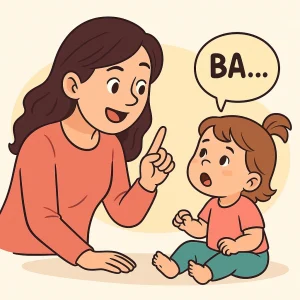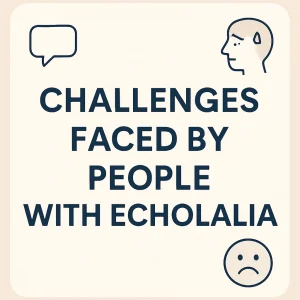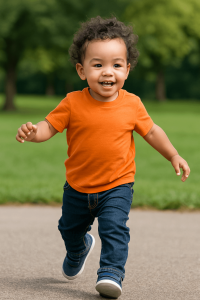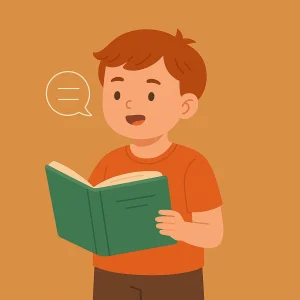How Many Words Should Your 2-Year-Old Know?
By Rajini D
Last Updated: October 30, 2024
Ever wondered if your child’s vocabulary is where it should be at age 2?
Watching your little one begin to talk is magical, but it can also spark questions and worries. Language milestones are key indicators of early development, helping you understand if your toddler is on the right path. You may hear about word counts or milestones from other parents, leaving you to wonder what’s “normal” for this age.
In this guide, we’ll simplify vocabulary expectations for 2-year-olds, covering the average word count, types of words, and natural ways to encourage your child’s language growth.
Typical Vocabulary Range for a 2-Year-Old
How Many Words Should a 2-Year-Old Know?
At the age of 2, most toddlers use anywhere from 50 to 200 words. This range may feel wide, but that’s completely normal—every child’s language journey is unique! While some 2-year-olds may be closer to the 50-word mark, others can comfortably use over 200 words, stringing together simple phrases like “want juice” or “big truck.”
It’s important to remember that word count alone doesn’t define a child’s language ability. Every word your child learns represents a small but significant step in their communication skills, bringing them closer to fully expressing themselves.
Also read: Speech Development Milestones: Your Child’s Talking Journey
Factors Influencing Vocabulary Range
Not all 2-year-olds reach vocabulary milestones at the same time, and that’s okay. Here are some key factors that can shape the number of words your child knows:
- Personality and Learning Style: Some toddlers are naturally more talkative and curious, eagerly mimicking new words. Others might be more observant, learning words silently and gradually starting to speak.
- Home Environment: In homes where parents and caregivers talk, read, and sing with toddlers, children are often exposed to a richer vocabulary. Even simple actions like naming items during daily routines (like “plate” during mealtime or “brush” at bedtime) help build language skills.
- Social Interaction: Toddlers who interact frequently with siblings or playmates may pick up words through playful conversations, games, and shared activities. Children in highly social settings, such as daycares, often hear a wider range of vocabulary, which can naturally boost their language skills.
When a Higher Vocabulary Range is Common
There are also certain scenarios where toddlers might know and use more words than average:
- Reading and Storytelling: In families where books are part of the daily routine, toddlers tend to learn words quickly. Storybooks introduce new vocabulary in a fun, engaging way, making it easier for kids to absorb and use those words themselves.
- Sibling Interaction: Older siblings often model language, using a variety of words and phrases. Younger children frequently pick up words by watching and listening to their siblings’ conversations.
- Frequent Outings and Activities: Trips to the park, library, or grocery store provide toddlers with exposure to new words and experiences, broadening their vocabulary naturally.
Word Types 2-Year-Olds Commonly Know
By the age of 2, toddlers begin to understand and use a variety of word types, from nouns and verbs to simple adjectives and social expressions. Here’s a look at the kinds of words that typically make up a 2-year-old’s vocabulary:
Everyday Nouns and Verbs
Most toddlers’ first words are nouns and simple verbs—familiar, everyday words that describe people, objects, and actions they encounter regularly. Here are some examples:
| Word Type | Examples |
|---|---|
| Family Members | Mama, Dada, baby, brother, sister |
| Food Items | Milk, juice, cookie, apple, snack |
| Favorite Toys | Ball, car, doll, book, teddy |
| Common Actions | Eat, drink, play, go, sleep, jump |
Using words like these, toddlers can begin to label things around them and describe simple actions. This stage of vocabulary development gives them the tools to start communicating their needs and interests.
Simple Adjectives and Basic Sentences
As vocabulary grows, toddlers start using simple adjectives to describe things around them, adding more context to their words. Common adjectives include words that help describe size, temperature, or quantity. Along with adjectives, many toddlers start forming basic two-word sentences.
- Basic Adjectives: Big, small, hot, cold, yummy, pretty
- Two-Word Combinations: More juice, want play, big truck, my ball
These early phrases are building blocks for more complex sentences. They also mark an exciting step in your child’s ability to express ideas beyond single words.
Social Words and Expressions
Social words are another essential part of a 2-year-old’s vocabulary. These are expressions and polite words that help them interact socially and connect with others. Here are some examples:
- Greetings and Farewells: Hello, hi, bye-bye
- Basic Manners: Please, thank you, sorry
- Expressions of Emotion: Happy, sad, love, ouch
Social words help toddlers understand the concept of polite language and emotional expressions, encouraging early social skills and positive interactions.
4. How to Gauge If Your Child’s Vocabulary is on Track
Signs of Healthy Vocabulary Growth
Tracking your child’s vocabulary development can give you a sense of whether their language skills are progressing as expected. Here are some signs that indicate healthy growth:
- Combining Words: By age 2, many children begin to combine two words to form simple phrases, like “want milk” or “big truck.” This shows they’re not only learning individual words but also understanding how to use them together to express ideas.
- Imitating Familiar Words: Imitation is a big part of language learning. If your child repeats words you say, especially words they hear regularly (like names, objects, or simple requests), it’s a strong sign they’re actively absorbing and processing language.
- Increasing Vocabulary: A healthy vocabulary growth means regularly adding new words, whether it’s names of people, favorite foods, or basic adjectives. This gradual expansion reflects a solid foundation in language skills.
Tracking Vocabulary Progress
Keeping a casual log of your child’s vocabulary can be a helpful way to track their language development over time. This doesn’t have to be complicated—just a small journal or a list on your phone will do.
- Start Simple: Write down new words as your child says them. Note the date and context if you like. Over time, you’ll get a clearer picture of the vocabulary they’re picking up.
- Observe Patterns: Look for trends, such as an increase in two-word phrases or a focus on certain types of words (like animal names or action words). Observing these patterns can help you see how their language skills are growing and evolving.
- Celebrate New Words: Treat new words as small victories! Each new addition to their vocabulary is a milestone worth celebrating, and your enthusiasm can encourage them to keep exploring language.
When to Consult a Professional
It’s natural to feel concerned if your child isn’t talking as much as other kids their age, but keep in mind that toddlers develop at their own pace. However, there are some cases where seeking guidance can be helpful:
- Fewer than 50 Words: If your 2-year-old is using significantly fewer than 50 words or has a limited range of vocabulary, it may be worth discussing with a pediatrician or speech therapist.
- Lack of Two-Word Phrases: By this age, most toddlers are beginning to combine words into short phrases. If your child isn’t doing this, a professional can help evaluate whether there may be an underlying delay.
- Difficulty Following Simple Instructions: Understanding language is just as important as speaking. If your child seems to struggle with basic instructions (like “bring the ball” or “sit down”), it might be a sign to explore language support options.
5. Practical Tips to Help Expand Your 2-Year-Old’s Vocabulary
Expanding your child’s vocabulary doesn’t have to be complicated. With a few simple, daily practices, you can encourage language growth in a way that feels natural and fun. Here are some effective strategies to boost your 2-year-old’s word learning:
Interactive Reading and Storytelling
Reading together is one of the most powerful ways to build vocabulary. Storybooks expose toddlers to new words, ideas, and sounds that they might not encounter in everyday life.
- Choose Engaging Books: Look for picture books with clear, colorful images and simple words. Books with repetition and rhyme can be especially helpful for language development.
- Pause to Talk About the Pictures: As you read, pause to point out pictures and ask questions. For example, “Can you find the dog?” or “What color is the truck?” These prompts encourage your child to engage with the story.
- Make Reading a Daily Routine: Whether it’s a bedtime story or a short book during the day, consistency is key. Regular reading boosts listening skills and encourages curiosity about words and language.
Describing Daily Activities
Narrating your daily actions is a simple yet powerful way to expose your child to new words. By hearing language connected to familiar routines, they can start to understand and eventually use these words on their own.
- Name Objects and Actions: As you go about your day, describe what you’re doing. For instance, “Now we’re putting on shoes” or “Look, here’s the yellow banana.” This helps your child associate words with actions and objects in their surroundings.
- Talk About Feelings and Senses: When your child is involved in an activity, add descriptive words related to their senses or emotions, like “This water feels cold” or “You seem happy.” This adds depth to their vocabulary and helps them express themselves better.
- Use Positive Reinforcement: If your child tries repeating a word or shows interest, respond enthusiastically. Positive reinforcement encourages them to keep exploring language.
Encouraging Repetition and Naming Games
Games that involve repetition and naming help reinforce vocabulary by giving toddlers the chance to hear and practice words frequently. Here are some fun ways to make learning interactive:
- Naming Game with Toys: Gather some of their favorite toys, and play a simple naming game. Hold up each toy and say, “This is a car,” “This is a doll,” and so on. Encourage them to repeat after you, making it fun and low-pressure.
- I-Spy Game: When you’re out and about or at home, play a modified “I spy” game by saying things like, “I see a tree” or “I spy a red ball.” This can introduce new vocabulary in a playful, engaging way.
- Singing Songs with Repetitive Words: Songs like “Old MacDonald Had a Farm” or “Wheels on the Bus” are excellent for language learning because they repeat simple words and phrases. Singing together helps reinforce new vocabulary and makes learning enjoyable.
Conclusion
At 2 years old, your child’s vocabulary might range from 50 to 200 words—and every word is a step forward! Each child learns at their own pace, so celebrate every new word and phrase. Simple daily interactions, reading together, and your encouragement all help them build language skills.
If you’d like more guidance on supporting language growth, Wellness Hub offers resources for parents on toddler language development. Embrace this journey and enjoy each milestone—whether it’s “mama,” “bye-bye,” or “want juice.” Every word is a joyful building block in your child’s unique path to communication.
Frequently Asked Questions:
1. How many words should a 2-year-old know?
By age 2, most toddlers use between 50 to 200 words. Some may speak closer to 50 words, while others might know over 200—both are completely normal! This wide range reflects each child’s unique path to language development. Vocabulary size can vary based on factors like family interaction, exposure to language, and personality. If your child is close to 50 words or even more, they’re likely on a healthy language development track.
2. What types of words should a 2-year-old say?
By 2, children typically say words they encounter often, like family names (Mom, Dad, sibling names), favorite foods (apple, milk), and toys (ball, car). They might also use some simple phrases like “want juice” or “big truck,” showing that they’re learning to combine words. This mix of people, objects, and actions is essential for building communication skills. If your toddler is using familiar words in everyday situations, they’re progressing well.
3. Is it normal for a 2-year-old to say only a few words?
Yes, it’s common for some 2-year-olds to use fewer words. Every child develops at their own pace, and language milestones can vary widely. If your child is using gestures, showing interest in communication, or imitating words, that’s a positive sign. However, if you’re concerned about limited vocabulary, consulting a pediatrician or speech therapist can offer helpful insights or reassurance.
4. How can I help my 2-year-old learn more words?
There are many simple ways to support vocabulary growth. Reading with your toddler introduces new words naturally. Talking about your daily routines, like “washing hands” or “putting on shoes,” helps them link words to actions. Games that focus on naming objects, like “I Spy,” and singing songs with repetitive words, such as “Old MacDonald,” make learning fun and interactive. Each activity you do together offers new opportunities for language learning.
5. When should I be worried about my 2-year-old’s vocabulary?
If your child is using significantly fewer than 50 words or struggles to combine words into simple phrases (like “more milk”), it might be a good idea to talk with a professional. Difficulty following simple instructions, such as “come here” or “give me the ball,” may also suggest a language delay. Early intervention can be helpful, and a speech therapist can provide guidance and resources tailored to your child’s needs.
6. What are some easy vocabulary activities for toddlers?
Vocabulary activities that incorporate play can make learning more engaging. Try simple games like “I Spy,” where you name and find objects around the house or outdoors. Naming objects during playtime, such as “car,” “bear,” or “book,” helps your child recognize familiar items. Singing repetitive songs like “Wheels on the Bus” is also effective, as repeating phrases builds confidence and reinforces new words in a fun, memorable way.
7. Can watching TV help my 2-year-old learn words?
While some shows introduce basic words, interactive activities like reading and talking together are more effective for language growth. Toddlers learn best from real-life conversations and responses, where they can see facial expressions and connect words to actions or objects. If you do choose educational content, try to watch with your child, pointing out words or discussing what you see to make it more interactive.
8. How do I track my child’s vocabulary progress?
Keeping a simple journal or list of new words your child says can be a helpful way to track vocabulary growth. You might jot down the date and context, such as a new word they learned during play or a phrase they used at mealtime. Watching their vocabulary expand over time can be a great way to see their progress and celebrate each new milestone together.
9. Do boys and girls learn words at different rates?
Some studies suggest that girls may start talking a bit earlier than boys, but each child’s language journey is unique. Differences in vocabulary size or when they start speaking are generally minor and typically even out over time. Focus on your child’s individual progress, and encourage them by engaging in language-rich activities, regardless of any gender-based trends.
10. Is it helpful to use baby talk when teaching new words?
Using clear, simple language is more effective than baby talk for teaching vocabulary. Toddlers benefit from hearing words used accurately, as this helps them learn to pronounce and use words correctly. Speaking in simple sentences and emphasizing key words can be helpful. For instance, saying, “Look, a big dog!” or “Here’s your cup” in a natural tone allows them to focus on the words that matter most.
About the Author:
Rajini Darugupally
M.Sc., Speech-Language Pathologist (9+ years of experience)
Rajini is a passionate and dedicated Speech-Language Pathologist with over 9+ years of experience, specializing in both developmental speech and language disorders in children and rehabilitation in adults. Driven by a desire to empower each individual to find their voice, Rajini brings a wealth of experience and a warm, genuine approach to therapy.
Book your Free Consultation Today
Parent/Caregiver Info:
Client’s Details:
* Error Message









